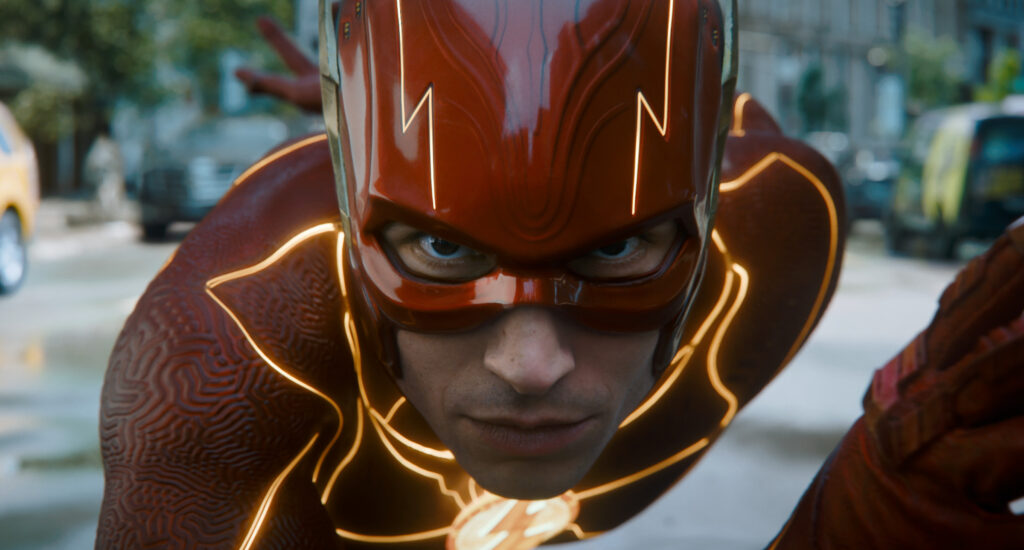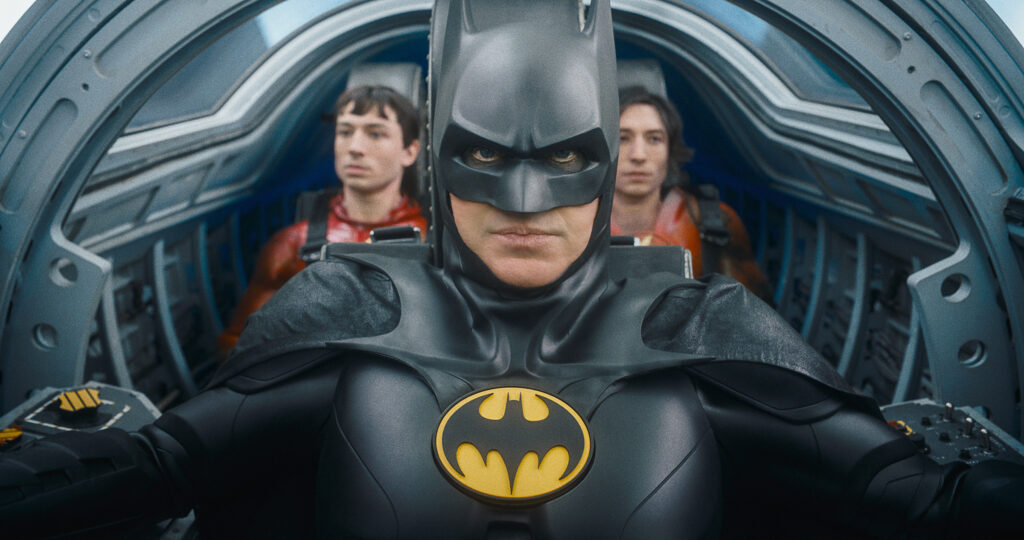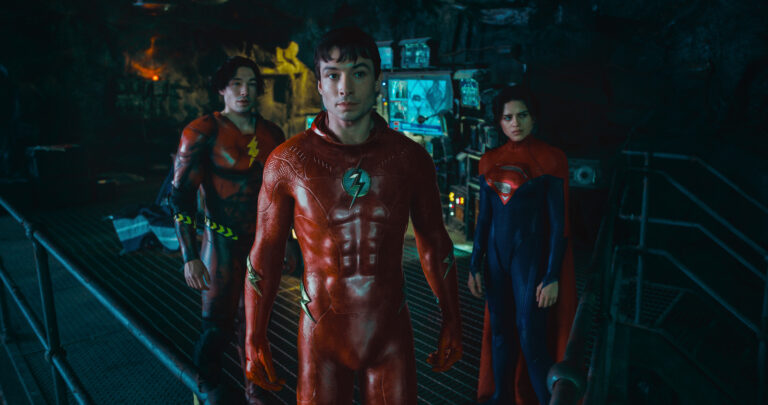The Flash (2023 | USA | 144 minutes | Andy Muschietti)
Akin to one of the great Golden Age comic book crossovers, James Gunn, having masterfully closed out his Guardians of the Galaxy trilogy, is hopping over to a cross-town rival to reboot the DC Extended Universe. But before clearing that slate and freshening the place up a bit, there’s still the (apparently) long-awaited chance for Flash to sprint into the spotlight. The main question you have to ask yourself when deciding if you’re going see this movie is “Does seeing Michael Keaton put on the ol’ Batsuit and once again speak aloud an ad-libbed catchphrase justify spending more than two hours with multiple versions of Ezra Miller and some pretty substandard CGI?”
If your answer is an enthusiastic “yes”, my guess is that you’ve already attended one or more of the many fan screenings that have preceded the rollout to the official premiere. And if you were in the audience for the one that I attended with local press, complete with wildly boisterous reactions to every call-out, throwback, and easter egg, it really seemed like you had a great time at the movies.
The mileage for those who were mystified when Flash Entering the Speed Force “won” the “fan-favorite” “Oscar” for “most cheer-worthy moment” of 2022/All Time might vary. Aside from the very real offscreen concerns about Ezra Miller’s erratic, and alleged criminal behavior, the time-travel caper itself is often – to steal a line from the film’s most charismatic guest star – “a hot mess”. It also has the ironic misfortune of arriving, like its protagonist, a bit late to the party. Superhero fatigue has set-in, multiversal malaise encroaches across media platforms, and a couple of weeks ago one of the finest comic book movies of the decade tangled with exactly these topics with exceptional dexterity, weaving a deeply considered emotional tapestry with stunningly inventive visual grammar and exquisitely nuanced character-work.
So … while The Flash is decidedly not Spider-Man: Across the Spider-Verse, almost nothing else is and it’s not really fair to make them fight. What we have instead is an occasionally goofy romp that plays on collective nostalgia to deliver a couple hours of fan-service callbacks strung together with a time-travel plotline. A good portion of it works well enough to enjoy a couple hours, a lot of it really doesn’t, and either way DC’s blowing the whole project up and starting fresh, so it has the feeling of polishing the decks on an evaporating ship.

Working from a script by Christina Hodson (who’s tinkered rather ably in the quippy genre realms with Birds of Prey and Bumblebee) director Andy Muschietti (both parts of It, whose commercials were too scary for me to watch) drops us right into the world of Central City superhero speedster Barry Allen. Irony of ironies, he’s perpetually late to work for his job at the forensics lab and there’s a new guy at his cafe who doesn’t know how to make his weird sandwich. Why a smart guy who can move faster than the speed of light doesn’t make his own lunches, needs a smartwatch to tell him when he’s hungry, and doesn’t rely on his powers to be on time is left unexplained, instead functioning as a shorthand for “personality”. Still, a socially awkward hero who can’t function while hangry and gets annoyed by slow people on sidewalks is representation I can get behind.
He’s torn away from the agony of waiting for takeaway by a call from Alfred to lend a hand in Gotham, to help partially clean up a Bat-mess at the hospital since all the other more famous heroes are busy. It’s a bizarre sequence involving newborns toppling from a collapsing glass tower. By now it’s a trope and one that we’ve seen executed better and more whimsically elsewhere. Although it functions to cast the mood as outlandish and comedic, the computer generated babies have the look of Ally McBeal 2.0 and the cute dog looks like a Snapchat filter, giving the whole gonzo rescue an unintentional dreamlike tone and setting low expectations for the visual effects that will persist throughout the rest of the adventure. In this opening setpiece, we also get cursory obligatory appearances from some of the Justice League in the form of Gal Godot’s Wonder Woman and Ben Affleck’s Batman that might as well be deepfakes. It’s kind of a pity, a lot of the production design and staging has a zippy energy and pop of classic comic book colors befitting its hero’s signature ability. The practical shots and sets are often staged with character, but anything at a grander scale looks hastily rendered with more shortcuts than inspiration.
Outside of super-hero-ing, Barry’s in a bad way. He’s not pals with any of his normal work colleagues, his house is a mess, and he’s generally sad and isolated. Even worse, his dad’s in jail (Ron Livingston, who just wants his maybe-asexual twentysomething son to finally get a date) and running out of appeals for having been falsely convicted of killing his mom (Y tu mamá también’s Maribel Verdú, inexplicably playing a heavily-accented Italian housewife). Barry wallows in gauzy memories of the day of her death with childlike recollection: a perfect parent who someone randomly stabbed in the chest in her own kitchen, in broad daylight, during the few minutes when the man of the house was out buying her the can of tomatoes she absent-mindedly forgot that day at the supermarket. It’s shot so oddly that you wonder whether she stabbed herself because her kid was being so annoying about solving a simple math homework in the most complicated way possible (her parting words: “not all problems have solutions”).
These memories make Barry realize that his recent encounters with the Speed Force mean that he could also fix the past if he just runs fast enough. Despite a heart-to-heart with Bat-fleck who tries to impress upon the younger proto-hero that “actually, bad things happening to us like dead moms are kind of good, in a way” Barry ignores centuries of storytelling about the dangers of time-tinkering and races back in time. This involves a sprinting very very quickly into some sort of clumsily animated amphitheater of possibilities, a “Chrono-seum” populated with garish spectators straight out of Google’s Deep Dream 0.1 and a perpetual quicksand at its center.

This sloppily-conceived nexus allows him to dip back into his past and, like many a naive time traveler before him, make a tiny tweak to history without considering (or caring about) the repercussions. With his mom saved, he tries to bolt back to the future, but is waylaid halfway between his childhood and present. There he encounters an eighteen-year-old version of himself: unburdened by a childhood without a dead mom and imprisoned dad, he’s dopier, more carefree, with annoying roommates, the beginnings of a romantic relationship, and longer center-parted hair. Oh, and no super powers. Impending doom in the form of Zod’s arrival on earth to find a young Kryptonian refugee pushes us into an origin-story retread, with older Barry coaching younger Barry through the particulars of becoming speedy and using his powers. Through this, he loses his own meta-human abilities and comes to realize he’s tripped not just into the past, but into an alternate universe (a distinction left explored only through a dish of sloppy spaghetti). With no superheroes around to save the planet; so the Two Barrys get to work assembling a Justice League.
Miller hams it up as both halves of this temporally-divided odd couple: allowing the uptight and empowered older hero to see why some people find him so annoying. It’s a fun setup and Miller is an admittedly dextrous performer who easily captivates the screen in small doses. But one Ezra Miller as the Flash is already A Lot, two of them borders on Too Much, and the effect is further compounded when they lose track of each character’s core personality traits. Devoid of much in the way of clever planning I’d expect from a couple of geniuses plotting a good caper, the “Getting the Gang Together” section is saved from being a complete slog by the welcome charisma of Michael Keaton (his appearance is meant to be a surprise, but it’s actively promoted as the reason to see the movie). Here, he’s an aged-up Bruce Wayne living out a happy retirement for a Gotham City steered clear of chaos, lightly grizzled with long hair and a fondness for ascots. Sure, we’ve already seen him as Birdman, commenting on the perils of the superhero industrial complex, but what is that relative to the thrill of hearing him once again grumble the words “I’m Batman” or “Let’s Get Nuts”?
A lot of this is admittedly fun (there’s a segment with a giant bat kite that cracked me up in its stupidity), but as its remix of previous franchise dragged on, it becomes an inadvertent advertisement about the dangers of multiversal storytelling as a consequence-free theme park of diminishing returns. I found myself mindlessly enjoying some of it, becoming slowly frustrated with its facile grappling with big questions about the centrality of tragedy for greatness, and eventually fatigued with the returns on remixing familiar characters. Some fare better than others. Keaton, of course, has more than enough charm to pull off the old familiar magic and it’s a genuine nostalgic pleasure to see him dusting off the old latex. The introduction of Super-Cousin (Sasha Calle) is less successful, mainly because we meet the justifiably surly teen way too late in the film for her to build more than the barest skeleton of character through a few line-readings. Instead, her whiplash motivations are explicable only insomuch as they’re required to grind the gears of plot ever-onward to a bland mis-matched confrontation with an under-developed Zod’s (Michael Shannon, encased in armor) planet-conquering alien army.
At this point, counterposing personal growth with global catastrophe feels unnecessary and almost lazy, and it almost feels like the filmmakers hearts aren’t in it for the seemingly mandatory final showdown. Incongruously staged in an anonymous desert, it’s a by-the-numbers plug-and-play Big Battle Between Super Powers with a couple of atrociously-animated extended climaxes that pits mommy issues against the fabric of the multiverse. One particularly egregious sequence will divide audiences: some will see a ghoulish nostalgia play that plunders the past for cheap thrills; others will express unbridled delight at things they remember from old times flicker across a big screen for a few seconds; many more may be numb by that point in the film. To the credit of its director and star’s performance, a sensitively-realized coda aims for an emotional note while it tries to tidy up the mess made over the previous two hours. Its effectiveness, and the unhinged thrill of a pre-credits stinger, will vary by viewer exhaustion. By its nature as an endcap, The Flash feels designed to be an ephemeral concoction, occasionally fraught, sometimes fun, made not to stay lodged in memory, but to fade once the lights come up to make way for whatever hopefully better thing DC has planned next.
The Flash arrives in theaters on June 16th. Images courtesy WB.



